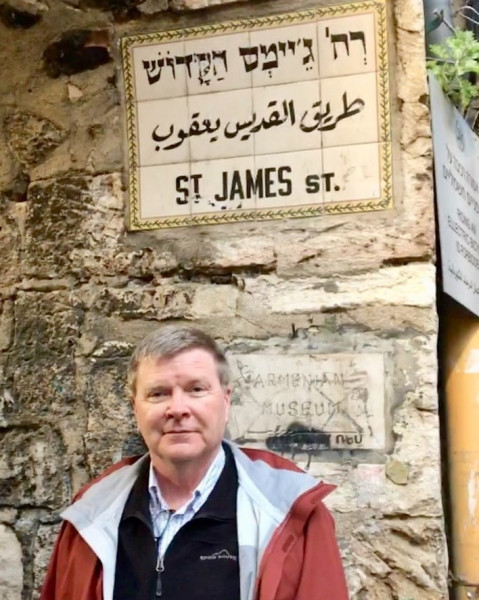Professor
About
Role:
FacultyPosition:
- Professor
Concentration:
- Middle East
Department:
- History
Education:
- PhD, University of Wisconsin
Biography
I joined the Department of History at Colorado State University in 1996. My teaching repertoire includes courses on ancient, medieval, and modern Middle East history. My research is focused on the history and historiography of the Islamic Near East in the middle ages.
Courses I teach regularly — generally, every other year (semester last taught)*
HIST 115 The Islamic World: Late Antiquity to 1500 (Spring 2025)
HIST 431 Ancient Israel (Fall 2023)
HIST 432 Sacred History in the Hebrew Bible and New Testament (Spring 2025)*
HIST 433 Muhammad and the Origins of Islam (Fall 2023)*
HIST 435 Jihad in Islamic History (Fall 2024)*
HIST 436 The Holy Land: Ancient to Modern (Spring 2024)*
HIST 532 Reading Seminar: Middle East (Fall 2024)
* Also offered via CSU Online.
Publications
Muslim Sources of the Crusader Period: An Anthology (edited and translated with Suleiman A. Mourad). Indianapolis: Hackett Publishing, 2021. Click here for the New Books Network podcast in which Suleiman and I discuss the anthology.
The Intensification and Reorientation of Sunni Jihad Ideology in the Crusader Period: Ibn ʿAsakir of Damascus (1105–1176) and His Age; with an edition and translation of Ibn ʿAsakir’s The Forty Hadiths for Inciting Jihad (co-authored with Suleiman A. Mourad). Leiden: Brill, 2013. (Issued in paperback in 2015.)
Historical Dimensions of Islam: Pre-Modern and Modern Periods—Essays in Honor of R. Stephen Humphreys (co-edited with Jon Armajani). Princeton: Darwin Press, 2009.
Daily Life in the Medieval Islamic World. Westport, CT: Greenwood Press, 2005. (Paperback: Hackett Publishing, 2008; Arabic Translation: al-ʿAlim al-Islami fi al-ʿUsur al-Wusta. Abu Dhabi Authority for Culture and Heritage, Kalima, 2012.)
Ibn ʿAsakir and Early Islamic History (ed.). Studies in Late Antiquity and Early Islam, no. 20. Princeton: Darwin Press, 2001. (Reissued: Berlin: Gerlach Press, 2021.)
Courses
-
HIST 431 Ancient Israel
This course examines the history of Ancient Israel and the Near Eastern world of the Hebrew Bible/Old Testament, with a focus on the emergence of the kingdom of Israel and its subsequent political history down to the Babylonian exile and return; the social world and rhetoric of the Hebrew prophets; and the textualization of the ancient Israelite/Jewish historiographical tradition down to the Persian, Hellenistic, and early Roman periods.
-
HIST 432 Sacred History in the Hebrew Bible and New Testament
This course examines competing conceptions of sacred history in the formative Jewish and Christian traditions. We will examine these issues through a comparative analysis of biblical figures that both traditions venerate. We will also examine competing conceptions of Jesus in Judaism and Christianity. In addition to relevant excerpts from the Hebrew Bible and New Testament, students will be expected to analyze post-biblical rabbinic midrash and classical patristic commentary on these scriptures, for it is only through this interpretive literature that we can understand the historical development of traditional Jewish and Christian conceptions of sacred history.
-
HIST 433 Muhammad and the Origins of Islam
This course examines the historical context of the emergence of Islam, its origins in seventh-century Arabia, and the rapid Islamic imperial conquests of the Byzantine and Sassanian Near East and much of the Mediterranean world by the mid-eighth century. We will examine important themes in the formation of the classical Islamic religious, legal, and historiographical traditions down to the early tenth century. Since the majority of the population resisted conversion to Islam during this period, we will also examine how Jewish and Christian subjects of the new Islamic empire were able to retain their distinctive religious identities while at the same time accommodating themselves to and interacting with the new Islamic imperial order in areas of politics, society, law, religion, etc.
-
HIST 435 Jihad in Islamic History
Competing conceptions of the ideology of “jihad in the path of God” in classical and modern Islamic thought and practice. Warfare and military conquest? An interior spiritual struggle to be a better person? Both? Something else? This course examines how Muslims have answered these pressing existential questions in the context of the early Islamic imperial conquests, the Crusader period, the early modern Islamic empires, 19th- and 20th-century jihadist movements, and the post-9/11 world.
-
HIST 436 The Holy Land: Ancient to Modern
Some history courses focus on a broad region over decades, even centuries. This course examines the history of a very small and contested region over a span of more than 3,000 years. Issues we will investigate include: the importance of physical geography, material culture, the Bible, and other ancient texts for understanding the history of ancient Canaan (biblical Israel & Judah) in the context of the ancient Near East; competing conceptions of the Holy Land in the Jewish (Eretz HaKodesh), Christian (Terra Sancta), and Islamic (al-Ard al-Muqaddasa) traditions in antiquity and the middle ages; and competing conceptions of the Holy Land in the context of the modern Middle East.
